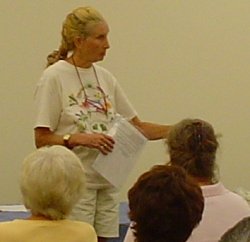Allergies and allergy symptoms - Page 1
The following article gives information about allergies and some insight into how allergies can be controlled.
It is possible that allergic reactions can be overcome and the body educated into changing these allergic phenomena.
What are allergies, is there relief and treatment?
Most people think that an allergic reaction to a substance is happening because of the substance itself. This is not strictly accurate. What happens is that the body's immune system tries to fight back against this substance and it is this which usually causes the abnormal reaction. In other words, it's your body's reaction and the chemicals the body releases, that cause the sneezing, the rash, or irritation or even worse reactions etc.
It is not the foreign substance or organism itself that causes this but your body's own immune system "over-reacting". Usually, this is an over-reaction to excess histamine, a chemical that the body releases to fight microbial invaders.
Why does the body have a reaction?
You may wonder why the body does this if these reactions are usually so unpleasant. Well, it is a survival mechanism. The body doesn't always know what it is that it thinks is attacking. To be on the safe side the body immediately goes into full-on war mode to defeat the attacker. In most cases, this is the best thing for the body to do. The down side to this natural mechanism is that it tends to be a little wild and it can lead to these relatively minor allergic reactions.
Hay fever season
One of the most common allergies is to pollen - Hay fever. But many people react to many different everyday substances. The reactions include sneezing, runny nose, wheezing, swelling or puffiness around the eyes, skin rash, hives, asthma or headaches.
What is pollen? Is it only found in flowers? Why can it trigger a reaction?
In most cases, pollen is a tiny grain or granule, much smaller than a grain of salt. When grains of pollen cling to each other in a mass, they feel almost powdery in texture. The pollen is actually the male half of the biological equation which allows plants and trees etc to reproduce and produce seeds etc.
The pollen grains themselves are incredible different from plant to plant when viewed under a microscope. Most of them have a rigid protective shell and some look quite smooth and some even look like they are spiky. It seems they are also even more irritating.
Breezy, warm days can be the worst
In many instances, pollen uses the wind as a transportation method. This means that at certain times of the year, the air can contain a high density of pollen spores or cells. When these are breathed in, the body can defend against this "invasion" and in doing so cause an allergic reaction.

It can be very annoying that some of the most pleasant days of the year, can also be the most painful and allergic!
This can be very unpleasant and some people react very severely. There are many types of pollen and some cause different reactions in people. The pollen can be from general plants and vegetation, or from farmer's crops or from forests or large areas of grassland.
Some parts of a country can produce more pollen than others and we have heard many reports of people changing location and dramatically reducing the effect of pollen caused hayfever. A common observation is that people who live near the coast, seem to suffer less than people who live inland in more vegetated areas.
Some people are more susceptible to hayfever than others. Studies have suggested that a person may be more susceptible if parents and grandparents also suffered.
Common "solutions" don't work very often
The conventional handling of allergies is by taking decongestants and antihistamines. Decongestants open clogged nasal passages and have a drying action. Antihistamines suppress the body's release of histamine.
But both of these are handling only the symptoms of the allergies, not addressing the cause, which is a confused immune system. And both have side affects: Decongestants can cause insomnia and raise blood pressure, Antihistamines may cause drowsiness.
A key step is to try and find out what it is in your environment, that is causing you to react. Could it be some chemical in your house or workplace? Could it be dust or pollen in your room? Perhaps there is mold growing somewhere, such as behind a wardrobe or in a damp place. More and more people are reacting against dust mites, especially in beds and on pillows.
Each of these things can be reduced if you first look for the cause and then take the right action to handle it. Get rid of or change the chemicals you use in your house. Get an air filter for the bedroom to collect dust and destroy the pollen. Handle the dampness and make sure air can flow behind cupboards etc to stop damp forming. Get some anti-allergic bedding and mattress covers. All of these things can really help.
Your diet and quality nutrition is an important factor
Another important factor relating to allergies is malnutrition. If your diet is lacking basic and vital nutrients you are more susceptible to allergies. People suffering from allergies have been found to be woefully deficient in most of the body's nutritional requirements except carbohydrates, and when the missing nutrients are supplied, the allergies often disappear or become more manageable. Whether this happens because a stronger body has a stronger immune system, we don't yet fully know. However, it seems the link is too strong to ignore.

A healthy cell can prevent harmful substances from entering them. A lack of almost any nutrient, however, increases cell permeability, so valuable nutrients can leak from the cells and toxic material passes into them. We must also mention parasites here.
If a person does have parasites this can heap more work onto an already overloaded immune system. As well as trying to fight off these invaders, the body also has to dispose of the waste products that the parasites themselves excrete into our bodies. It is important to ensure that you try to follow a well-balanced diet as often as possible. It should contain a decent amount of raw, unprocessed foods such as salads, as well as fresh fruit and vegetables especially those high in vitamin C.
It has been mentioned throughout the website that ensuring you drink enough good water each day is one of the fundamentals of good health.
( See page 2 for more information. )





